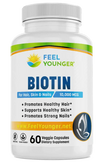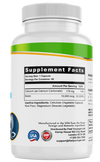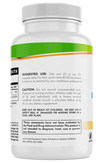High Potency 10 000 mcg of Vegan Biotin
- Product Description
- Supplement Facts
Would you like:
- Improved Hair, Skin and Nail Health
- Increased Metabolism
- Healthier Brain Function
- Immune System Support
How can Biotin help with this?
Optimal levels of Biotin can potentially give you all these benefits and more.
Biotin works as a coenzyme to help break down food, such as carbohydrates, fats and protein which in turn, may lead to increased energy levels.
Biotin is essential for myelin sheath formation, a fatty substance that encompasses nerves and facilitates nerve impulse conduction. As such, Biotin deficiency can delay myelination.
Vitamin B7 (Biotin) also plays a crucial role in white blood cell development.
How can Biotin help with this?
Optimal levels of Biotin can potentially give you all these benefits and more.
Biotin works as a coenzyme to help break down food, such as carbohydrates, fats and protein which in turn, may lead to increased energy levels.
Biotin is essential for myelin sheath formation, a fatty substance that encompasses nerves and facilitates nerve impulse conduction. As such, Biotin deficiency can delay myelination.
However, Biotin is most commonly used for:
Healthy Skin - Biotin helps maintain the mucous membranes of the skin. Biotin also plays a crucial role in the metabolization of fat, which is necessary for maintaining healthy skin.
Healthy Nails - A biotin deficiency may lead to brittle nails.
Healthy Hair - Many hair products that claim to encourage healthier, stronger hair contain Biotin. Biotin deficiency may lead to hair loss, which indicates that the vitamin might be involved in keeping the hair healthy.
What is Biotin?
Also known as vitamin B-7 or vitamin H - Biotin is a coenzyme for carboxylases, the enzymes that assist in the metabolic processing of fats, proteins, and carbohydrates for energy production [1].
Biotin is a water-soluble vitamin. This means it is not stored in your body for long. Your body does not manufacture it naturally, either. However, bacteria in your gut (called intestinal flora) can produce Biotin.
Biotin is also needed for the development of white blood cells and a deficiency can be linked to impaired immune function and an increased risk of infection [2].
How was it discovered?
Biotin was first identified as a nutritive requirement of yeast. Originally called vitamin H, it was isolated in pure form in 1935; its structure was established in 1942, after it had been shown to be required by animals. Evidence for the necessity of biotin appeared with the discovery in 1927 that the addition of uncooked egg white to a diet that is otherwise nutritionally adequate, can produce toxicity and disease. This is because egg white contains a specific protein, avidin, that combines with biotin and thus prevents its absorption.
Optimal Biotin levels Increase Metabolism
Biotin is a coenzyme for carboxylases, the enzymes that assist in the metabolism of fats, proteins, and carbohydrates for energy production [3].
These enzymes are essential for the following processes:
- Gluconeogenesis, the metabolic pathway that produces glucose from non-carbohydrate sources including amino acids [4].
- Cellular energy production [5].
- The use of branched-chain amino acids (e.g., leucine, isoleucine, and valine) for neurotransmitter production and energy [6].
- Synthesis and breakdown of fatty acids for energy [7].
- Insulin release [8].
Inadequate vitamin B7 levels in the body can slow down metabolism, which may lead to fatigue, digestive problems, and weight gain [9].
Healthy Brain Function requires Optimal Biotin levels
Biotin is required for myelin sheath formation, a fatty substance that surrounds nerves and facilitates nerve impulse conduction. As such, biotin deficiency can delay myelination [10].
Biotin deficiency may also lead to a number of other neurological symptoms, including seizures, lack of muscle coordination, learning disabilities, hallucinations, depression, and lethargy. Most of these conditions can be resolved with biotin supplementation when they are caused by biotin deficiency [11].
Optimal Biotin levels Support the Immune System
Biotin increases the production of Th1 cytokines like IL-1β and IFN-γ, which are essential for eliciting an immune response to combat bacterial and viral infections [12].
Poor levels of vitamin B7 are associated with decreased antibody synthesis, T cell decay, and lower amounts of spleen cells and T cells in both animals and humans [13].
Decreased rates of cellular proliferation during Biotin deficiency may account for some of these adverse effects on immune function [14].
Biotin is a coenzyme for carboxylases, the enzymes that assist in the metabolism of fats, proteins, and carbohydrates for energy production [15].
How do you know if you’d benefit from more Biotin?
There are several factors that can deplete your Biotin or increase your need for Biotin. These include:
The BTD gene encodes biotinidase, an enzyme that recycles biotin. Biotinidase transports free biotin through the bloodstream and attaches biotin to other proteins [16]. Certain SNPs related to the BTD gene can increase your dietary requirement for Biotin.
Lipoic acid competes with vitamin B7 for binding to the sodium-dependent multivitamin transporter (SMVT) in the intestine, so long-term use of lipoic acid could result in depleted vitamin B7 levels [17].
Similarly, large doses of vitamin B5 (pantothenic acid) have the potential to compete with vitamin B7 for absorption by the SMVT [18].
Prolonged use of antibiotics like tetracycline and sulfonamides can reduce biotin levels because they kill biotin-producing bacteria in the intestines [19].
Furthermore, some anticonvulsants such as primidone and carbamazepine inhibit vitamin B7 absorption. Chronic anticonvulsant use can also increase vitamin B7 breakdown [20].
Raw egg whites contain the protein avidin, which binds biotin tightly and inhibits its absorption [21].
Smoking accelerates biotin breakdown, especially in women, resulting in marginal biotin deficiency [22].
Chronic alcohol consumption can inhibit intestinal biotin absorption [23].
You can do a blood test to assess Biotin levels, but a more sensitive and accurate test to measure for suboptimal biotin levels is for the urinary metabolites 3-Hydroxypropionic Acid (3-HPA) and 3-Hydroxyisovaleric Acid. Talk to your Practitioner to arrange these tests for you if you think you may be low.
Why try Feel Younger® Biotin 10,000mcg for Hair, Skin and Nails
Our Biotin capsules are high quality, high purity, contain no binders and are vegetarian and vegan friendly.
Here at Feel Younger, we believe in supplying effective quantities, at reasonable prices… and that’s why a bottle of our Biotin capsules gives you a 10,000 mcg dose and costs a maximum of $15, with larger discounts available for subscriptions of purchases of multiple bottles.
How do you take Biotin 10,000mcg for Hair, Skin and Nails?
Take 1 capsule a day with water, preferably 20-30 minutes before a meal, or with a meal, depending on the advice of your healthcare practitioner
ALWAYS consult your doctor or pharmacist before taking Biotin supplements, especially as biotin supplementation can provide inaccurate results on some blood tests.
Any cautions?
Taking too much Biotin may cause skin rashes, digestive upset, problems with insulin release and kidney problems.
Biotin is generally considered safe and no toxicity has been reported for doses up to 300,000 mcg/day orally and 20,000 mcg intravenously [24].
Since it is a water-soluble vitamin, vitamin B7 overdose is unlikely as excess amounts are excreted in the urine [25].
Scientific References:
- https://www.ncbi.nlm.nih.gov/pmc/articles/PMC3508090/
- https://jn.nutrition.org/content/130/2/335S.full
- https://www.ncbi.nlm.nih.gov/pmc/articles/PMC3508090/
- https://www.ncbi.nlm.nih.gov/pubmed/18613815/
- https://www.ncbi.nlm.nih.gov/pubmed/19727438
- https://www.ncbi.nlm.nih.gov/pubmed/15930469
- https://www.ncbi.nlm.nih.gov/pubmed/15968460
- https://www.ncbi.nlm.nih.gov/pubmed/19727438
- https://www.ncbi.nlm.nih.gov/pmc/articles/PMC2726758/
- https://www.ncbi.nlm.nih.gov/pubmed/18545994
- https://www.ncbi.nlm.nih.gov/pubmed/21696988
- http://jn.nutrition.org/content/133/3/716.full
- https://www.ncbi.nlm.nih.gov/pubmed/88554
- https://www.ncbi.nlm.nih.gov/pubmed/14991266
- https://www.ncbi.nlm.nih.gov/pmc/articles/PMC3508090/
- https://ghr.nlm.nih.gov/gene/BTD
- https://www.ncbi.nlm.nih.gov/pubmed/9516450
- https://www.ncbi.nlm.nih.gov/pubmed/23578027
- https://www.ncbi.nlm.nih.gov/pmc/articles/PMC2726758/
- https://www.ncbi.nlm.nih.gov/pubmed/15539280/
- https://www.ncbi.nlm.nih.gov/pubmed/14747666/
- https://www.ncbi.nlm.nih.gov/pubmed/15447901
- https://www.ncbi.nlm.nih.gov/pmc/articles/PMC3064116/
- https://www.ncbi.nlm.nih.gov/pubmed/25787192
- https://www.ncbi.nlm.nih.gov/pmc/articles/PMC2726758/
Antibiotic Free
Gluten Free
All Natural
Sugar Free
Vegan Friendly
Vegetarian
Hormone Free
Made in the USA
No Binders
Lactose Free
This product contains:






